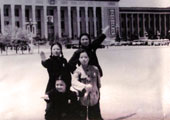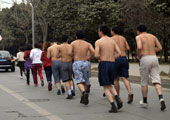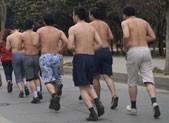
A labor shortage is sweeping through both the Pearl River Delta and Yangtze River Delta regions, the country's two major economic powerhouses.
LTN Classic, a garment firm in Guangzhou, is looking for more than a dozen sewing workers, but hired only half as many as it needed, as the capital city of South China's Guangdong province expects a shortage of 110,000 workers right after the Lunar New Year holiday.
"We can fill our administrative posts but can hardly get all the general workers we want," design director Zhang Wei said at the company's stand at Guangzhou's first post-holiday job fair, which opened on Wednesday.
General worker hiring has been difficult over the past few years as job opportunities become available in other parts of the country, Zhang said.
His company has been able to meet half of its demands for such workers, leaving part of its capacity idle, which pushes up costs.
Such workers, who earn 4,000 yuan ($640) to 5,000 yuan a month, have come to the company with newly hired production managers or through friends, Zhang said.
Shanghai faces similar problems finding workers to fill lower-paid positions, as workers' demands have been higher than expected.
Li Huaying, the owner of the Shanghai Litan job agency, has noticed the trend. Li's company holds annual job fairs at the Shanghai Railway Station to recruit migrant workers after the Spring Festival holiday.
"We've got about 2,000 vacancies available at the moment, but few contracts were signed in the past week as some of the migrant workers haven't returned from their hometowns, and some demanded higher-income jobs," Li said.
A majority of the listed vacancies in Li's company offer jobs with a monthly salary of over 2,000 yuan, while most of the applicants require a minimum income of 3,000 yuan.
"It has been difficult for a company to hire an ordinary worker without any specific skills with a monthly salary of 2,000 yuan, a salary that was unacceptable for migrant workers in Shanghai," Li said.
Li added that migrant workers now pay more attention to working conditions, social welfare and leisure time.
Her agency will start this year's fair on Monday because the peak period for job searches will be after Sunday, when the majority of migrant workers will return from their Spring Festival breaks.
Even as more than 90 percent of workers in enterprises are expected to return to their posts in Guangzhou in the two months after the Chinese New Year holiday, Guangzhou will still face a shortage of 110,000 workers, according to the city's human resources and social security bureau.
A survey of 326 enterprises involving 219,300 migrant workers found that more than 80 percent of the enterprises expressed an urgent hiring demand, mainly for general workers.
Enterprises are offering 9 percent to 12.5 percent pay rises to newly hired workers, the survey found.
"Our company normally raises the workers' monthly incomes by 10 to 20 percent annually even during the tough periods like the previous year," said Shen Jiandong, a senior sales manager for Jiangsu Goldsun Textile Science and Technology Co Ltd.
 |
















 Employees run half-naked for not meeting sales quotas
Employees run half-naked for not meeting sales quotas


![]()
